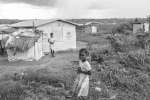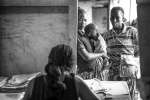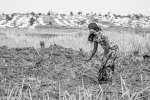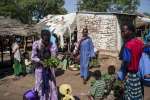UNHCR seeking urgent access to thousands fleeing Bangui, CAR violence
Briefing Notes, 29 September 2015
This is a summary of what was said by UNHCR spokesperson Leo Dobbs – to whom quoted text may be attributed – at the press briefing, on 29 September 2015, at the Palais des Nations in Geneva.
Fighting between rival militias in the Central African Republic capital of Bangui since Saturday has left at least 36 people dead, forced thousands to flee their homes and moved the reconciliation process a step backwards.
UN troops have been deployed to restore order however as of this morning UNHCR staff in Bangui say the situation is very tense with shooting in the city centre. The situation is worryingly reminiscent of late 2013 and 2014, when thousands were killed and tens of thousands forcibly displaced by inter-communal conflict. With numerous reports of rival armed groups gathering in the provinces and Bangui we fear the situation could escalate. UNHCR joins others in appealing for calm.
Fighting and the numerous roadblocks have made an already difficult humanitarian situation worse, impeding the ability of UNHCR and partners to gain access to thousands of internally displaced people and assess needs. All sides should urgently allow humanitarian organizations access to areas hosting the newly displaced.
UNHCR, with the help of the International Organization for Migration and other partners, estimates that at least 27,400 people have been displaced, including 10,000 who are sheltering at the Mpoko site near the airport, which was already hosting about 11,000 people.
There are immediate needs for emergency shelter, health care and basic aid. If the situation remains volatile, there will be a need for food supplies and hygiene and sanitation facilities. Displaced people are reported to be in a state of shock and extreme fear. Many have been displaced repeatedly.
Bangui had been relatively peaceful for months but renewed fighting began last Saturday after the killing of a young Muslim moto-taxi driver. The violence has caused panic in the capital, where a curfew has been imposed. Elections in CAR are scheduled for October 18.
In addition to the deaths, hundreds of civilians have been injured and need treatment, but medical teams have difficulty reaching them, according to Médecins Sans Frontières.
Several international organizations have had their compounds looted. On Monday night, gunmen entered the house of a UNHCR staff member and stole belongings.
Also yesterday evening, hundreds of detainees escaped from Bangui's Ngaragba Prison, with many reported to have joined the anti-Balaka militia group, which has been fighting the former Seleka militia.
The violence is a reminder of how fragile and unpredictable the security situation in CAR remains, with armed elements still present in some neighbourhoods of Bangui, and in control of several towns and localities in the centre and north of the country (including Bambari, Batangafo, Kaga-Bandoro, Mbres, Kabo).
UNHCR joins the interim UN humanitarian coordinator, MINUSCA and others in calling on all sides for an end to the fighting and to ensure the protection of the civilian population. Social cohesion efforts and dialogue between both communities need to be consolidated as the peace process is clearly still very fragile.
Prior to this latest violence Central African Republic had an internally displaced population estimated at 370,000 people, with 470,000 people having fled into surrounding countries as refugees. The refugee response plan presented by UNHCR and 17 partners to provide protection and assistance to CAR refugees in neighbouring countries has received 23 % of the required US$ 331 million funding, leaving a gap of US$ 254 million.
For more information on this topic, please contact:
- In Bangui, Dalia Al Achi at +236 72675186 / 75362625
- In Geneva, Leo Dobbs at +41 79 883 6347























































